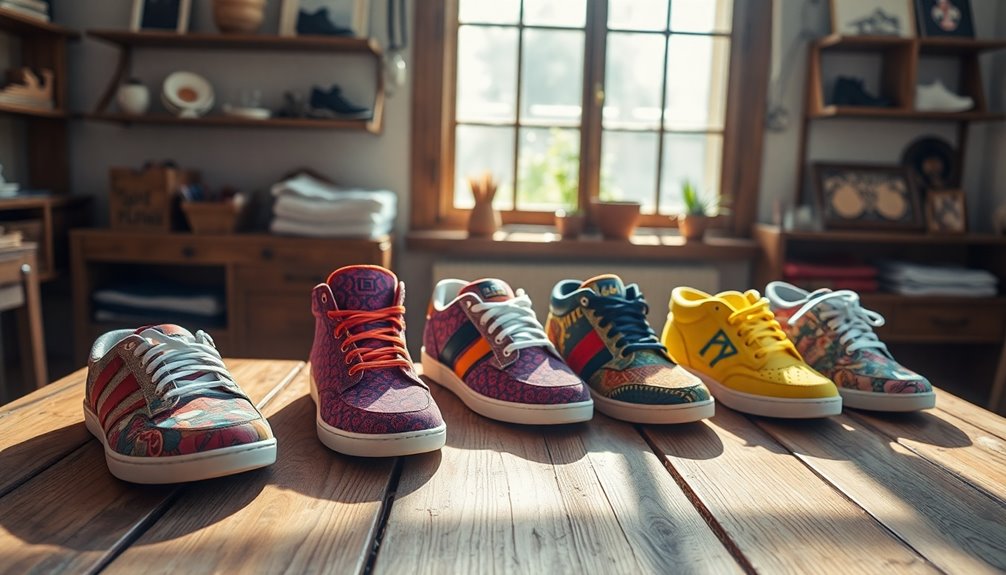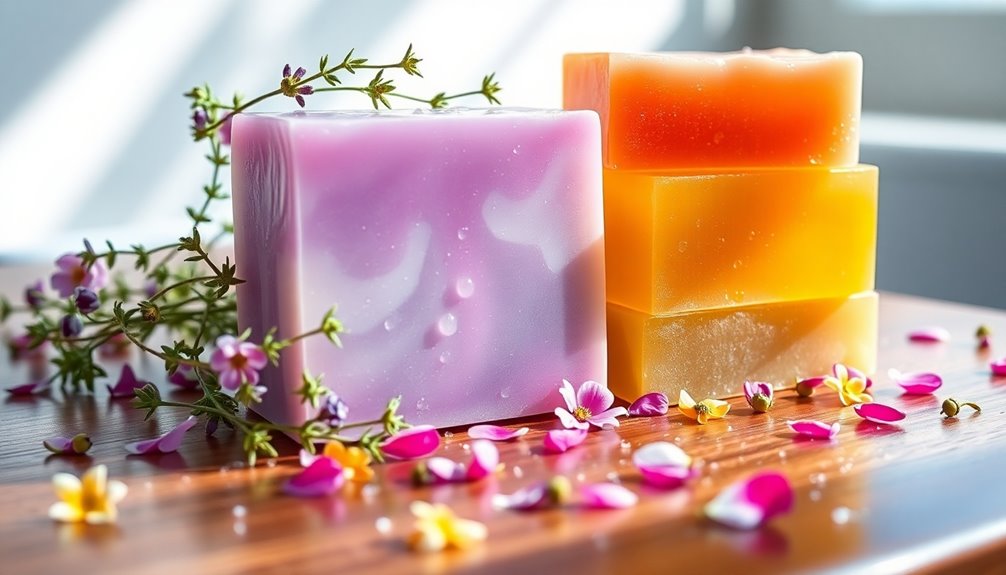When you explore shoe brands supporting Israel, you'll notice a shift toward brands that intertwine fashion with social responsibility. Major names like Adidas and Puma face scrutiny for their affiliations, prompting consumers to reconsider their choices. Younger generations prioritize ethical practices and are more inclined to boycott brands linked to controversial stances. On the other hand, brands like Tory Burch contribute to humanitarian causes, promoting community engagement. If you're seeking alternatives, consider ethical footwear options that align with your values, reinforcing the idea that fashion can make a difference. There's much more to uncover about this impactful trend.
Key Takeaways
- Major brands like Puma and Converse face backlash for their ties to Israel, prompting calls for boycotts and ethical scrutiny from consumers.
- Youthful consumers increasingly prefer brands that align with their values, prioritizing ethical consumerism over convenience.
- Brands are urged to enhance transparency and ethical practices to build trust and loyalty among consumers concerned about social justice.
- Alternatives like Veja and Ethletic offer ethical footwear options, emphasizing sustainability and fair trade practices for conscientious shoppers.
- Humanitarian initiatives by brands, such as donations to aid organizations, reflect a growing commitment to community engagement and social responsibility.
Overview of Supporting Brands
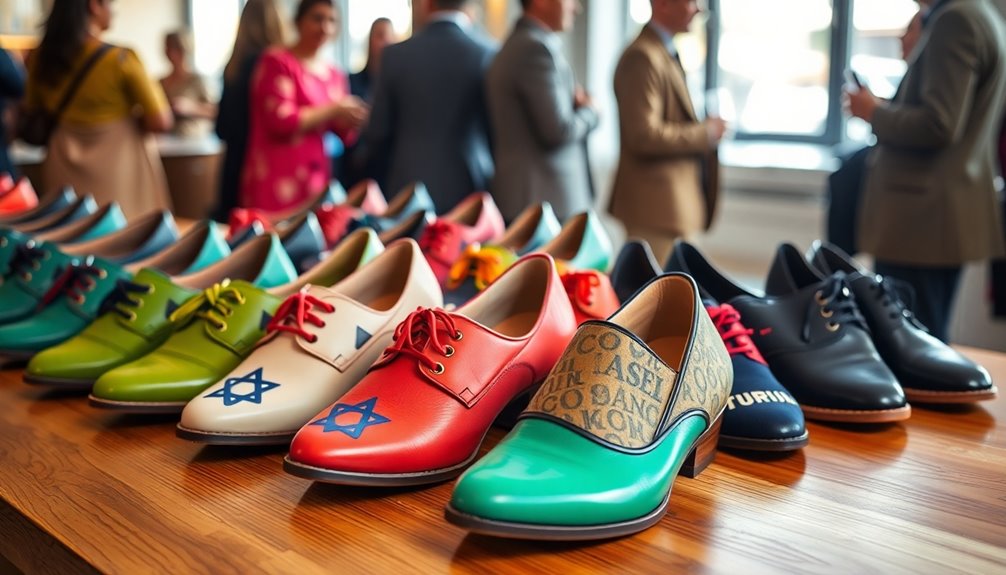
As consumers become more aware of the political implications of their purchases, major shoe brands like Adidas and Nike are facing mounting scrutiny for their ties to Israel. Many consumers are calling for a boycott of Israeli-affiliated brands, pushing for greater accountability regarding financial ties to the region.
Puma, for instance, has been linked to the Israeli Football Association, and there's strong pressure to end its sponsorship due to the association's activities related to the occupation. Converse, owned by Nike, has also drawn criticism for its support of Israeli policies, further fueling the demand for ethical consumption.
Younger consumers are increasingly favoring brands that align with their values, and this shift is evident in the rising popularity of ethical alternatives like Veja and Ethletic. These brands prioritize social responsibility, offering options that don't compromise ethical standards for profit.
The ongoing tensions surrounding brand involvement in the Israeli-Palestinian conflict are reshaping consumer behavior, pushing many to reconsider their loyalty to major shoe brands. As you make purchasing decisions, consider how these financial ties impact the broader socio-political landscape and what your choices say about your values.
Impact of Consumer Choices
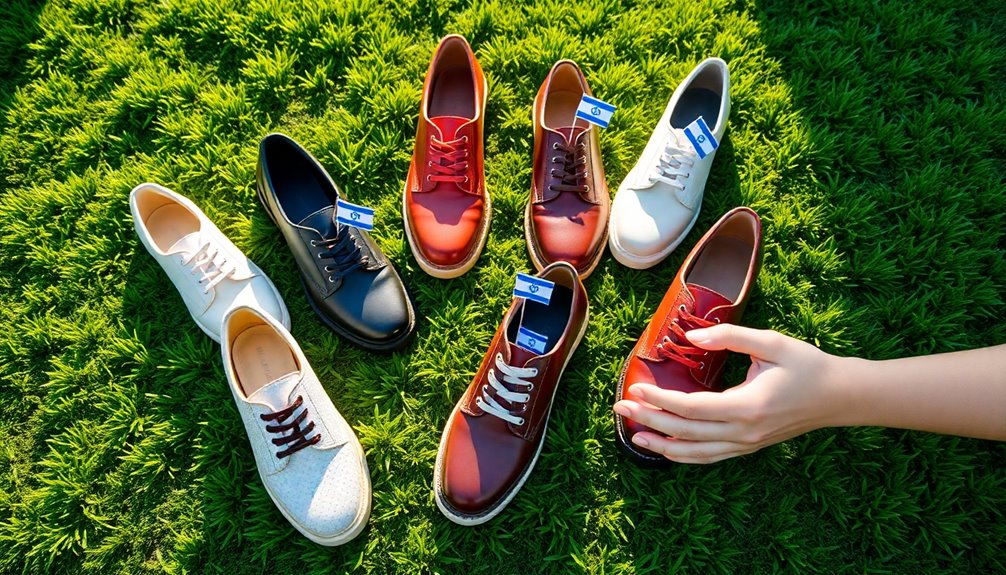
Consumer choices greatly shape the landscape of the footwear industry, especially when it comes to brands like Adidas and Nike. Your purchasing decisions can directly influence the financial performance and public perception of these companies, particularly in light of their support for Israel.
Recent surveys show that around 99% of individuals are likely to boycott brands with ties to Israel, demonstrating the power of collective consumer action.
As an ethical consumer, you're part of a growing movement that prioritizes values over convenience. Brands that support controversial political stances risk losing market share, especially among Millennials and Gen Z, who are increasingly aware of the implications of their purchases.
With the rise of alternative footwear brands that focus on ethical practices and social responsibility, you have options to express your beliefs through what you buy.
The increased scrutiny on footwear brands regarding their involvement in geopolitical issues has shifted consumer loyalty towards companies that align more closely with your ethical considerations.
Humanitarian Initiatives by Brands
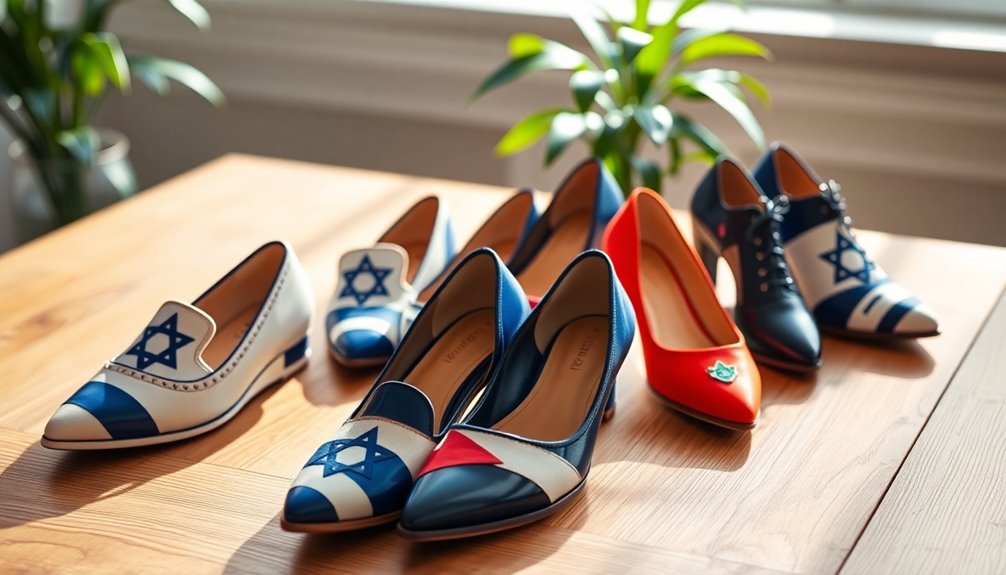
As you explore how shoe brands respond to crises, you'll notice many are stepping up with significant humanitarian initiatives.
Companies like Tory Burch and Chanel aren't just focusing on profits; they're actively engaging in community support and corporate social responsibility by donating to relief efforts.
These actions highlight the importance of brands playing a role in humanitarian aid during challenging times.
Corporate Social Responsibility Efforts
Corporate social responsibility (CSR) is becoming increasingly essential for brands, especially during times of crisis. Major shoe brands are stepping up and demonstrating their commitment to humanitarian aid. For instance, Tory Burch and Pierre-Yves Roussel have donated $250,000 to organizations like the International Committee of the Red Cross, showcasing their dedication to those affected by the ongoing conflict.
Chanel has taken a bold stance by committing $4 million specifically for humanitarian assistance. This reflects a strong understanding of CSR's role in providing aid during critical situations.
The PVH Foundation is also making strides by pledging support to both Israeli and Palestinian Red Cross organizations, emphasizing a balanced approach to humanitarian efforts.
Additionally, Authentic Brands Group has launched a one-for-one matching program for donations, which encourages community support and amplifies their philanthropic impact.
Meanwhile, Goldman Sachs is contributing $2 million in aid and will match employee donations, reinforcing the importance of corporate involvement in financial services that directly support humanitarian initiatives.
These actions not only highlight the brands' commitment to CSR but also their role in making a tangible difference in the lives of those in need.
Community Engagement Projects
In today's world, it's inspiring to see how major shoe brands are stepping up with community engagement projects that truly make a difference.
These fashion houses recognize their responsibility to contribute to humanitarian aid, especially in times of crisis. Here are some key initiatives making an impact:
- Chanel's Commitment: Pledged $4 million specifically for humanitarian assistance, demonstrating their commitment to support those in need.
- PVH Foundation's Support: Financial contributions to both Israeli and Palestinian Red Cross organizations show their dedication to addressing humanitarian needs on both sides.
- Authentic Brands Group's Matching Program: Launched a one-for-one initiative to double donations for civilians affected by the conflict, reinforcing corporate social responsibility.
Additionally, Jefferies raised an impressive $13 million for humanitarian aid, highlighting the financial sector's involvement in this critical issue.
While major fashion events like the Fashion Trust of Arabia Awards 2023 faced postponements due to regional tensions, it's clear that these community engagement efforts are essential.
Transparency and Ethical Practices
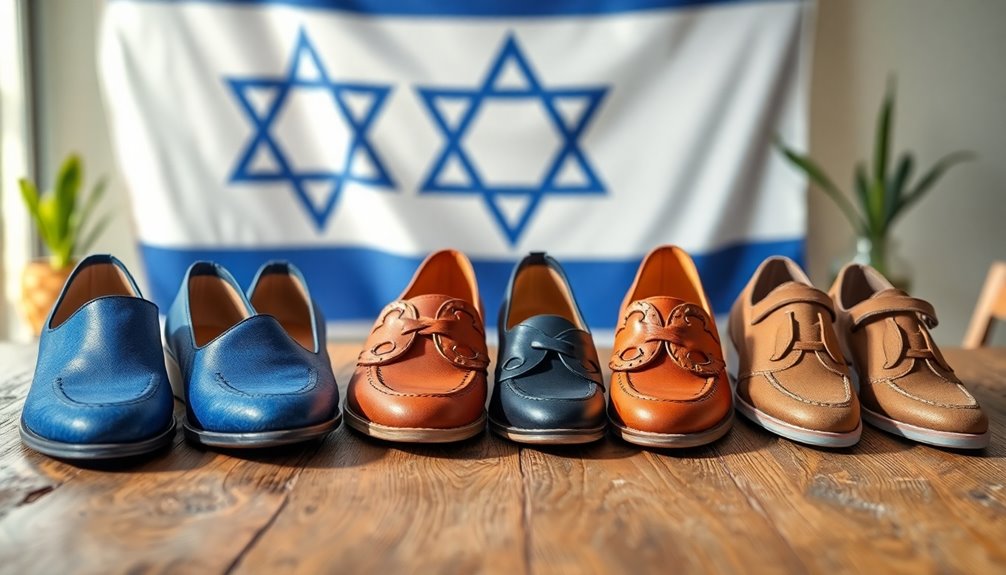
Many consumers today demand transparency and ethical practices from the brands they support, especially in light of global issues like human rights. As a consumer, you're likely aware of the growing calls for shoe brands like Adidas and Nike to clarify their business ties to Israel.
Ethical consumerism is rising, particularly among younger demographics who prioritize brands that openly disclose their involvement in humanitarian issues.
Transparency in financial contributions and support for humanitarian aid can notably influence how you perceive a brand. For instance, companies like Tory Burch and Chanel have garnered positive attention for committing funds to humanitarian initiatives.
On the flip side, if a brand lacks clear communication about its ethical practices, it risks reputational damage. You're more inclined to boycott brands you see as complicit in humanitarian violations.
With ongoing scrutiny of corporate practices, it's essential for shoe brands to adopt transparent policies and engage in social responsibility.
By doing so, they not only maintain credibility but also align with your values as a consumer, enhancing loyalty and trust in their brand.
Ultimately, your voice and choices can drive meaningful change in the industry.
Alternatives to Boycotted Brands
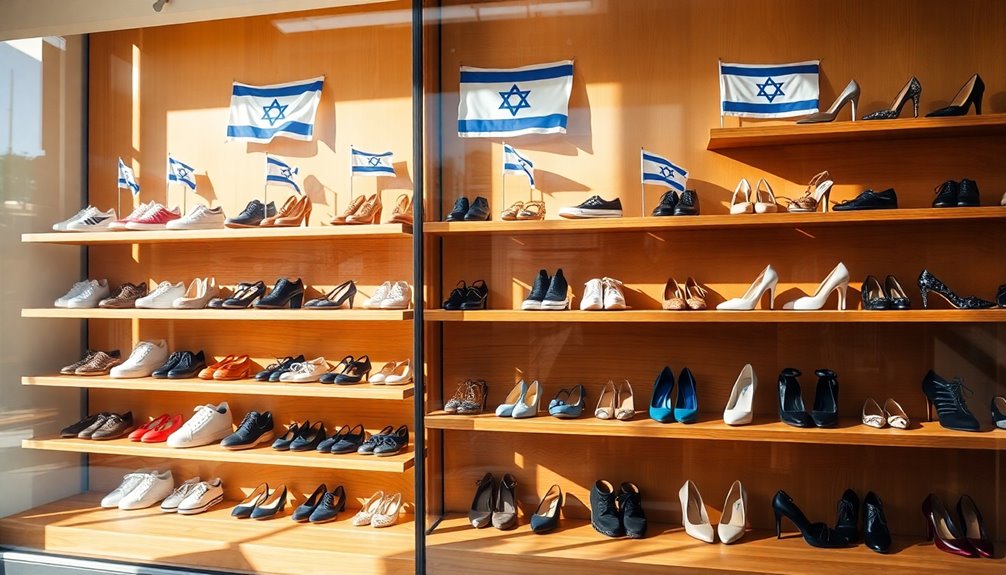
If you're looking for ethical footwear options after boycotting certain brands, there are plenty of stylish alternatives available.
Consider choosing companies like Veja or Wills Vegan Shoes, which prioritize sustainability and cruelty-free practices.
Ethical Footwear Options
When you're looking for ethical footwear options, several brands stand out as excellent alternatives to those currently facing boycotts. These brands prioritize sustainable practices and animal rights, ensuring you can shop with a clear conscience.
Here are a few significant choices:
- Ethletic: Known for fair trade practices and sustainable materials, Ethletic is a leader in ethical footwear.
- Veja: This brand emphasizes ethical sourcing and environmentally conscious production, making it a favorite among socially responsible consumers.
- SAYE: With a focus on eco-friendly materials and a transparent supply chain, SAYE is committed to reducing its environmental impact.
Additionally, consider exploring the pre-owned market. Platforms like Depop and Poshmark let you score stylish footwear while promoting a circular economy and reducing waste.
Brands like THTC and MUD (Make Up Drop) also offer stylish options that prioritize ethical labor practices and sustainability in their manufacturing processes.
Sustainable Fashion Choices
As consumers become more aware of the impact of their purchasing choices, seeking sustainable fashion alternatives to boycotted brands has gained traction. You can find several brands committed to ethical and eco-friendly practices that align with your values.
For instance, Ethletic focuses on fair trade and uses eco-friendly materials, ensuring your footwear choices support positive change.
Veja is another great option, known for its transparency in sourcing and commitment to ethical production.
If you prefer a more casual approach, consider shopping at Preworn, which offers a selection of second-hand shoes. This promotes circular fashion and helps reduce waste by encouraging the reuse of existing products.
For those who prioritize vegan options, Wills Vegan Shoes provides stylish, cruelty-free footwear made from sustainable materials, catering to the growing demand for vegan fashion.
Additionally, MUD (Make Up Done) emphasizes ethical manufacturing processes and eco-friendly practices in their footwear line, appealing to conscious consumers like you. Furthermore, choosing brands that prioritize sustainable materials can significantly reduce your environmental footprint while supporting ethical practices.
Brands Promoting Fair Trade
Many consumers are actively seeking brands that promote fair trade practices as alternatives to those facing boycotts.
By choosing fair trade footwear, you not only make a fashion statement but also support ethical alternatives that prioritize social justice and sustainability. Chia seeds, known for their high nutritional value, can serve as a reminder of the importance of supporting sustainable practices in other areas of consumption. Diversification strategy can also be an important consideration for consumers looking to create a more balanced wardrobe. A commitment to whole, unprocessed foods can further enhance your lifestyle choices in conjunction with ethical fashion. Additionally, incorporating foods rich in vitamins A, C, and K can support overall health while you make mindful purchasing decisions.
Here are a few brands you might want to take into account:
- Veja: Known for eco-friendly sneakers, they source materials from fair trade cooperatives in Brazil, ensuring both environmental sustainability and fair wages for workers.
- Ethletic: This brand uses organic cotton and Fair Trade certified materials, emphasizing transparency in their supply chain while positively impacting communities in developing regions.
- TOMS: While they're famous for their one-for-one model, TOMS also champions fair trade practices, ensuring ethical production processes.
Additionally, supporting brands that prioritize natural sourcing methods can enhance your commitment to sustainability and social responsibility.
Community Engagement and Support
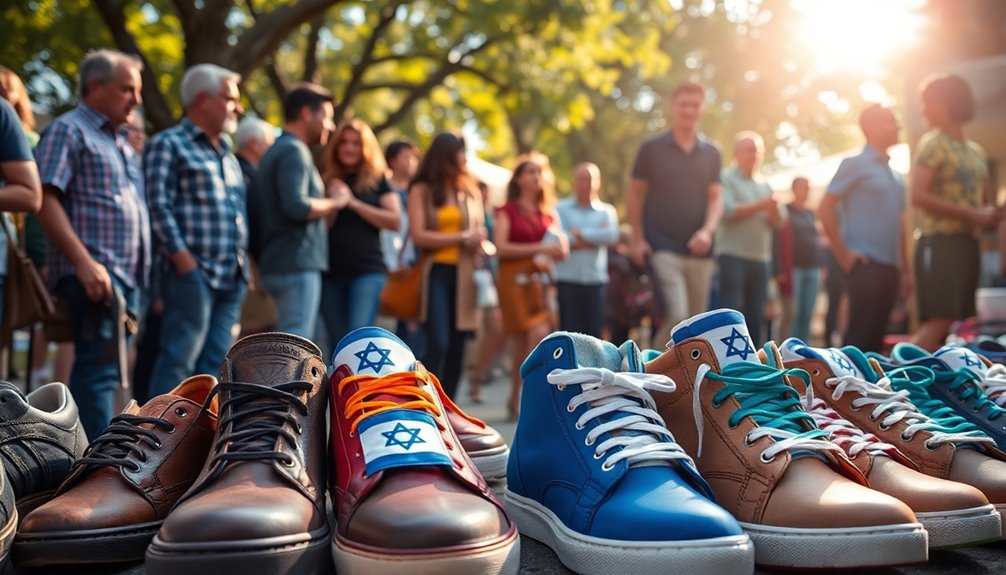
Community engagement has become an essential force in advocating for ethical consumption in the footwear industry. As you navigate your purchasing decisions, it's important to understand the impact of shoe brands' business operations and their ties to Israel. Many consumers, like you, have begun reporting and sharing information about these brands, fostering a network committed to ethical buying practices.
With the rise of social media, you can easily voice your concerns alongside others. Platforms allow you to promote boycotts against brands that don't align with ethical considerations, amplifying your message and connecting with like-minded individuals.
Educational campaigns play a significant role in this movement, teaching you how to understand barcodes and product origins. This knowledge empowers you to make informed choices about the footwear you purchase.
Furthermore, initiatives that promote alternative brands emphasizing human rights and ethical sourcing are gaining traction. By supporting these companies, you're not just shopping; you're making a statement.
Your involvement in community engagement can help reshape the footwear industry, encouraging a shift toward more conscientious consumption. Together, you can champion a more ethical landscape for footwear.
Fashion Industry's Social Responsibility
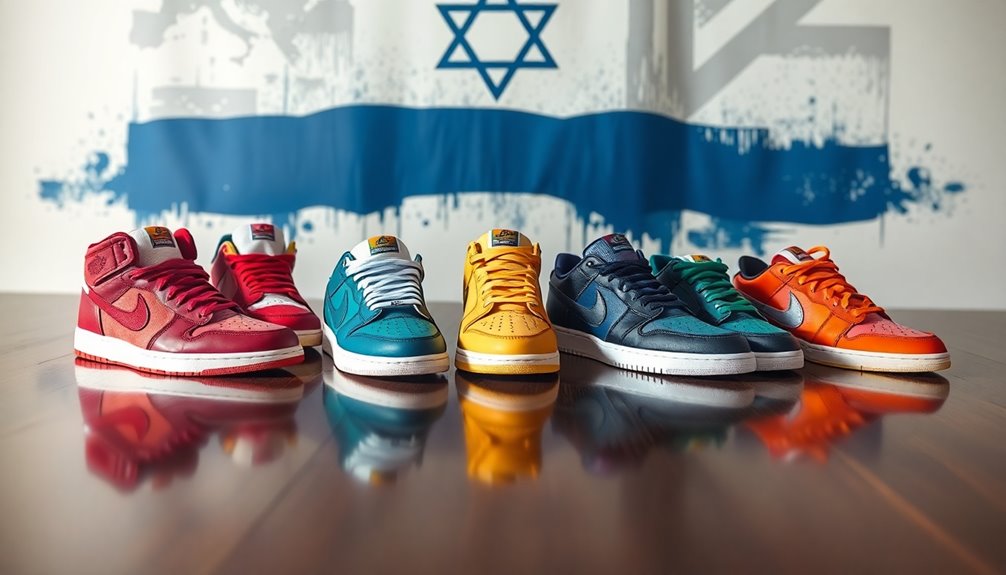
Increasingly, the fashion industry faces pressure to demonstrate social responsibility, especially concerning brands with ties to Israel. As consumers become more aware of ethical implications, your purchasing decisions are influenced by these values.
Major shoe brands like Adidas and Puma have faced backlash for their perceived support of Israeli military actions, leading to calls for boycotts and ethical alternatives.
Here are some key points driving this shift:
- Younger consumers prioritize brands that align with their ethical values.
- Transparency in donation processes fosters trust and community engagement.
- Fashion events are increasingly canceled to show solidarity during humanitarian crises.
The demand for social responsibility means that brands can no longer ignore their impact on global issues.
Many are now encouraged to partner with relief organizations, offering humanitarian support in response to crises.
By choosing brands that demonstrate a commitment to ethical practices, you contribute to a movement that values compassion and integrity.
The fashion industry must evolve to meet these expectations, ensuring that your choices not only reflect your style but also your commitment to a better world.
Future Trends in Ethical Fashion
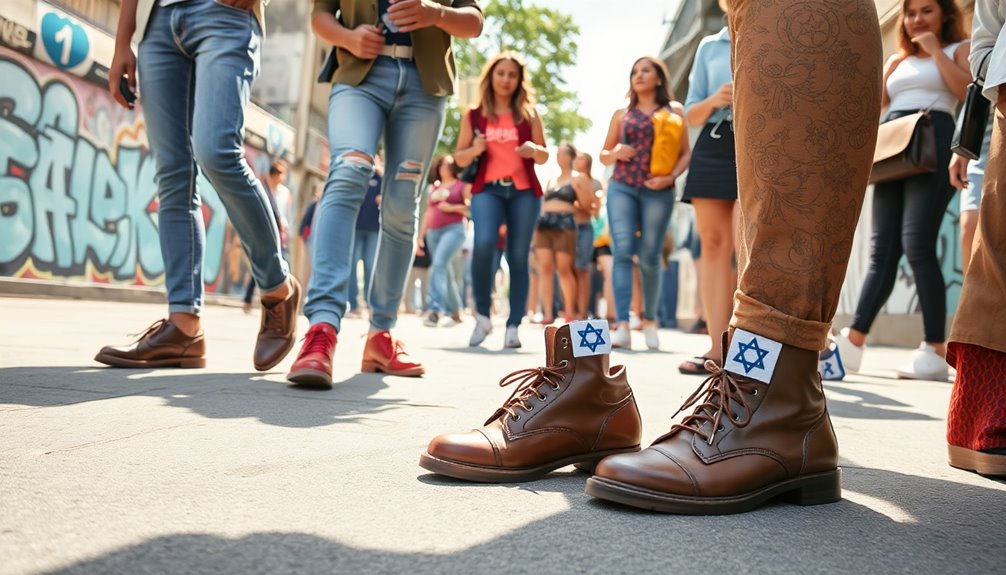
The future of ethical fashion is shaping up to be both innovative and consumer-driven, as shoppers demand greater transparency and sustainability from brands. With 66% of consumers willing to pay more for sustainable products, it's clear you want your choices to reflect your values.
By 2025, millennials and Gen Z will represent 70% of the luxury market, pushing brands to prioritize ethical sourcing and sustainable practices.
As you consider your clothing purchases, over 50% of consumers, like you, are now factoring in environmental impact. This shift is prompting brands to enhance transparency in their supply chains, making it easier for you to choose responsibly.
The rise of the pre-loved market also reflects a significant change in consumer behavior; with second-hand clothing sales projected to reach $64 billion by 2024, you're seeking sustainable alternatives to fast fashion.
Brands that ignore these trends risk losing your loyalty, as 79% of consumers believe that companies should prioritize social responsibility.
In this evolving landscape, your preferences shape the future of ethical fashion, driving brands toward practices that align with your values and beliefs.
Frequently Asked Questions
What Brands Are Supporting Israel?
When you look at brands supporting Israel, several well-known names come to mind.
Nike engages in business operations there, while Adidas has faced accusations related to the military.
Puma's contract with the Israeli Football Association has sparked controversy, and Dr. Martens reportedly has dealings in the region.
New Balance also operates in Israel, linking its brand to the local economy.
Each of these brands plays a role in the ongoing economic landscape.
Which Shoe Company Supports Palestine?
Imagine walking in shoes that stand for something greater. When you're looking for a shoe company that supports Palestine, consider brands like Veja or Toms.
These companies prioritize ethical practices and often advocate for social justice, aligning with pro-Palestinian values. By choosing them, you're not just making a fashion statement; you're making a statement about your values.
Your choice can contribute to a movement that seeks equality and justice for all.
What Fashion Brands Support Israel?
When you're looking into fashion brands that support Israel, you might consider companies like Adidas, Nike, and Puma.
These brands have faced scrutiny for their business activities linked to Israel. Adidas has been accused of backing the Israeli military, while Nike operates within Israel, raising ethical concerns.
Puma's sponsorship of the Israeli Football Association also garners criticism. As you explore your options, think about how these affiliations align with your values.
Which Shoe Brands Are Israeli?
When you're looking for Israeli shoe brands, you'll find a few prominent names.
Brands like Naot and Teva stand out, with Naot specializing in comfortable sandals and Teva known for its outdoor footwear.
You might also come across brands like Keds, which, while originally American, has ties to the Israeli market.
Exploring these options will give you a taste of the local footwear scene and its unique offerings.
Conclusion
As you choose your next pair of shoes, remember the impact your decision can make. Supporting brands that align with your values not only elevates your style but also champions humanitarian efforts. While some brands face boycotts for their actions, others rise with transparency and ethical practices, weaving compassion into their fabric. You can step forward in fashion with purpose, paving the way for a future where style and social responsibility walk hand in hand.
